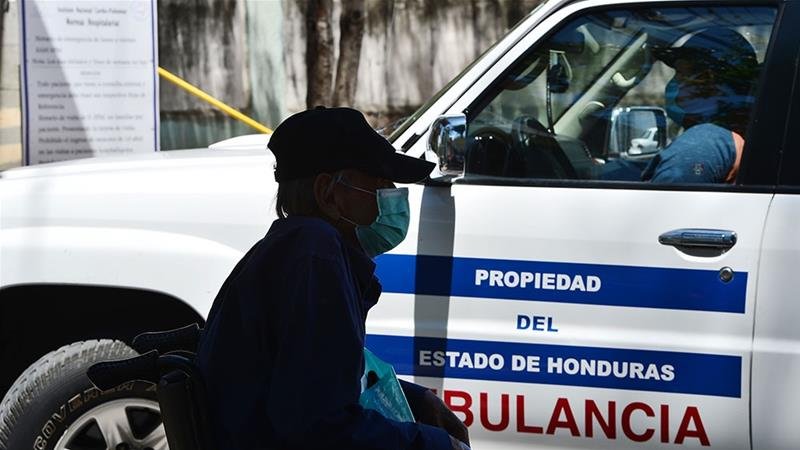Impact of the COVID-19 in Central America

Tucked between North and South America, Central America presents a curious case in terms of economy, military and history. While the Spanish focussed on other privileged colonies such as modern-day Venezuela and Colombia, Central America was considered to be a burden. Known for its fruits, plantations and Caudillos, economic development never really touched this region. Apart from Costa Rica that boasts of a properly functioning democracy and takes pride in being a state without a standing army the others such as Nicaragua, Honduras, El Salvador, Guatemala, Belize and Panama paint a sorry picture. Home to transit routes for drugs, the origin of illegal immigrants to the United States and a hotbed of Cold War era violence not much has been discussed about Central America.

Covid-19 in Central America- Adding to the trouble.
The economy of Central America is based on agriculture, the export of agro-based commodities and small scale industries such as food processing, animal husbandry, textiles and assembly line (known as Maquila) production. Migration within the states is quite common and being a tropical region the fruit industry is also endowed. Despite entrenched in a Free Trade Agreement with the United States (DR-CAFTA), the benefits accrued have been rather skewed. While low skilled jobs did find its place in the region, without political will and the desire to diversify the economy the region finds itself at the beck of larger economies such as the United States or the PRC.
The sudden and unannounced arrival of the pandemic caused by the spread of the Covid-19 has left Latin America in tatters, not to mention that the indigenous people are at the worst end of suffering. The impact of the virus is so severe that the global economy tends to shrink and virtually every country is affected. Central America on the other hand, does not boast of a strong economy that may be able to absorb the economic repercussions. A major part of the revenue is through remittances from expats in the United States, but with the United States deporting them en masse not only the risk of spreading the virus has increased, but it has also added to unemployment and reduction in foreign remittances. Newly arrived Central Americans who have been deported are adding to the list of already unemployed people mostly from the rural regions. With the spread of the virus, most have fled the cities back to their villages and without work. These internal migrants depended on the sale of farm products grown in the countryside, but without a market and buyers, they run the risk of starving to death. Additionally, many have turned to crime to receive anything by any means and the law enforcement agencies are in a dilemma. The crisis has impacted the entire food supply chain, where labour is not available for harvest and due to lockdown transportation of crops, fruit and vegetables is next to impossible.
The situation is so grim that whereas on the one hand there is a risk of starvation on the other crops are rotting away. In Nicaragua, drought, lack of relief and the crisis has impacted the farmers to a large extent. Due to drought, most farmers found work at local factories and maquilas, but with the impact of the Covid-19, most have been laid off, without fields to work on they are at an immense loss. Similarly, Honduras was hit at a time when it’s the season of drought and forest fires. Already the state government is incapable of handling such crises added to the pandemic which has threatened livestock and agriculture the mainstay of the Honduran economy. Countries like Honduras, El Salvador and Nicaragua do not have the means to contain the spread of the virus, neither can they take care of the economy and the worst hit are the low-level farmers and retailers. Many are laid off from work due to inadequate means of dispensing wages which is adding to the crumbling of the entire economy. While other countries in the world are taking to e-commerce in order to tide over the situation, these small Central American states do not have the means to impose such solutions on a gigantic scale. Guatemalans also complain of the lack of support from the government now that many of them have lost their jobs in the United States resulting in a halt in flow of remittances.

On a flipside, Central American gangs have now taken up the task of enforcing the lockdown using tactics that could be termed as undemocratic and threatening. These gangs live off extortion, but as of now they are not claiming their renta (extortion money), instead, they are enforcing the lockdown. Others do not believe that the gangs have reformed and claim that once the lockdown is annulled the same gangs will start extorting which will contribute to the economic woes. It is interesting to note that most of the Central Americans work in the informal economic sector with little savings, resulting in no backup for a situation like this. Like the rest of Latin America, Central America is not prepared to tackle this situation.
Elsewhere in El Salvador, matters took an ugly turn with the young president Nayib Bukele clashing with the Salvadorian Congress over the reopening of the economy. Added to the crisis was the increased number of criminals in prisons after the state cracked down on criminals. While the opposition argued that otherwise, the Salvadorian economy would suffer, the president argued on the contrary that it would otherwise lead to massive infection among the citizens. El Salvador is a sad example of how a small state is affected to that extent that it has to make a hard decision between economy and safety of its citizens.

On a general note like Latin America, the Central American region was also caught unawares and was severely unprepared to tackle the pandemic. Years of debt, inflation, non-diversification of the economy and poor government response and control has contributed to the crisis started by the pandemic. Like other Latinos, Central Americans are now forced to choose between death by the virus or starvation. Riots and frequent clashes with government agencies is complicating matters and the governments are undecided regarding a permanent solution.
Elsewhere, Nicaragua is also facing flak for its poor handling of the crisis. Not only does it have territorial disputes with neighbouring Costa Rica, but ages of violence and military rule has ruined the economy of the country even before the pandemic struck. While Costa Rica declared a state of emergency and lockdown after the detection of its first case on the 6th of March 2020 and also took up relief work sternly, Nicaragua, in contrast, did not act swiftly. It is well understood that the response to the Covid-19 by one state may affect others and in this case, Nicaragua’s poor handling may impact its neighbours adversely. It is the only state to not enforce a lockdown, rather encouraging people to work and lead normal lives. The problems posed by the crisis has exposed a deep fault line in most of the Central American countries with governments unable to handle it and also reshape the economy according to the needs. Deciding between lives and economy must be the hardest decision ever.
In contrast, Costa Rica stands out as a shining example of what proper decision making and handling can do. Although troubled by Nicaragua’s impertinence, the Costa Rican government has managed to tide better over the crisis. Costa Rica officially reported its first Covid-19 case in March and then swiftly declared a state of emergency and declared a lockdown. It chose people over the economy and of course, the small state is economically better poised to absorb the shock created by the pandemic. The crisis no doubt has affected the economy with the Costa Rican economy expected to shrink by 4 percent by the end of the fiscal year. Tourism, agriculture and export of small scale goods are the most affected by the pandemic, the disruption in the tourism sector will affect around 8 percent of the country’s Gross Domestic Product. Also, it is important to note the absence of organised gangs in the country which has led to violence in other Central American republics and the fact that the Ticos (terminology used to describe Costa Ricans) followed the government suggestions strictly. Even then, there will be a massive impact on the economy with an estimated loss of 500,000 jobs and a widening fiscal debt.

In conclusion
Unpreparedness, casual response and inability to enforce the lockdown once declared marked the responses of almost all the Central American states, except Costa Rica. The result, a spike in cases and further inability to deal with testing and medication. The difficultly that lies now is the path to recovery and rejuvenating the economy. With small companies, migrating workers and the informal sector being the worst hit, there are possibilities of tremendous social unrest. The question that arises, can the Central American states with a history of economic and systemic negligence rise up to the unprecedented challenge?


















